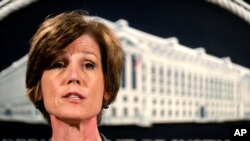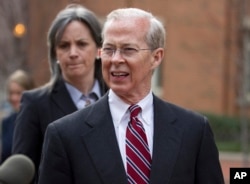President Donald Trump's decision Monday to fire an insubordinate acting attorney general was not unprecedented, but it is a rare occurrence in presidential history.
Since President Harry Truman began his first presidential term in 1945, only 35 presidential appointees have been fired, according to a report compiled by Larry Sabato, director of the University of Virginia Center for Politics, and published by Politico.
Trump's predecessor, President Barack Obama, faced heavy pressure to fire Secretary of Health and Human Services Kathleen Sebelius after her bungled rollout of the Affordable Care Act — known as Obamacare — and Attorney General Eric Holder after Holder was found in contempt of Congress for refusing to hand over documents related to the Fast and Furious gun-tracking scandal. Each time, Obama stood by his appointees. However, both Holder and Sebelius later resigned.
General Stanley McChrystal, whom Obama appointed to command U.S. troops in Afghanistan in 2008, was the highest-level appointee to be let go during Obama's two terms. McChrystal was forced out in 2010 after making unflattering remarks about the Obama administration during an interview with Rolling Stone magazine.
He tendered his resignation June 23, the day after the story was published online, and Obama accepted the resignation later that day.
Media spectacle
Presidential historian Michael Beschloss told NPR that Cabinet-level officials are fired "extremely rarely," and that modern presidents, especially, are reluctant to fire high-ranking officials because of the media spectacle it creates.
"You are probably going to have a situation in the future where presidents saddle themselves with people who should be fired, and they're afraid to do it because they're afraid it's going to hurt them politically," Beschloss said in 2013.
Beschloss cited President Jimmy Carter's 1979 firing of four Cabinet secretaries as an example of why presidents are hesitant to fire top-level appointees, saying it contributed to Carter's re-election loss to Ronald Reagan the following year.
"He wanted to show that he was changing the terms of his administration. It completely backfired," Beschloss said. "His polls plunged."
People saw it as a confession by Carter "that he was going down in flames," Beschloss added.
Trump, however, gained wide popularity hosting a reality television show in which he coined the catch phrase "You're fired," and he has succeeded politically while bucking most political norms. He barely hesitated before firing Acting Attorney General Sally Yates on Monday, after she refused to enforce his executive order that suspends U.S. entry of all refugees for 120 days, bans Syrian refugees indefinitely, and blocks people from Iraq, Iran, Libya, Syria, Sudan, Yemen and Somalia — all countries identified with jihadist violence — from entering the U.S. for three months.
A statement from the White House released after the firing said Yates' actions had "betrayed the Department of Justice."
"Ms. Yates is an Obama administration appointee who is weak on borders and very weak on illegal immigration," the statement said.
Order's legality questioned
Earlier Monday, Yates issued written guidance to Department of Justice employees saying they should not defend the order against legal challenges. While Yates noted in her letter the executive order had been reviewed and approved by the Office of Legal Counsel, she still questioned its legality and instructed DOJ employees to disregard it.
Trump replaced Yates with Dana Boente, a U.S. attorney from the state of Virginia, until the Senate confirms his pick for attorney general, Alabama Republican Senator Jeff Sessions, which is expected to happen this week.
Some of Trump's political opponents criticized the decision, including leading Senate Democrat Chuck Schumer of New York, who called it "chilling," but Trump wasn't the first president to fire a Cabinet secretary. From 1945 until the Trump firing, 12 presidents had fired 19 Cabinet agency heads, including Carter, who fired his secretaries of treasury, energy, transportation, and health, education and welfare, now known as health and human services.
According to the list compiled by Sabato, defense secretaries are the most likely Cabinet appointees to be fired, with Presidents Truman, Lyndon Johnson, Gerald Ford, Bill Clinton and George W. Bush all getting rid of the Pentagon leaders. Truman, Ford and Bush all saw a drop in approval ratings after the firings.
Presidential approval ratings rose in only five instances after firing Cabinet appointees, Sabato wrote, but "all of the gains appear to be minor and short term."
"Therefore, if the point of a sacking or a shuffle is to give the president a boost in the Gallup Poll, history suggests it isn't going to work," he wrote. "It can easily be counterproductive, bringing to the public's attention in a dramatic fashion that there is trouble afoot, serious enough to have cost someone his or her job."






